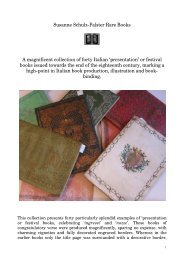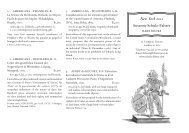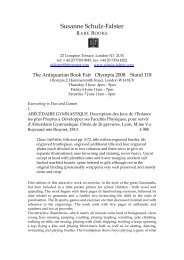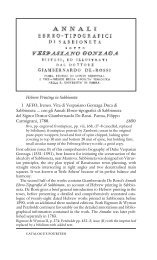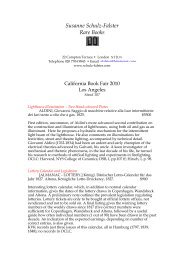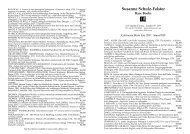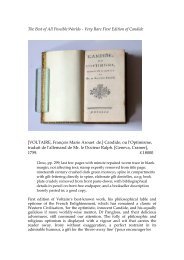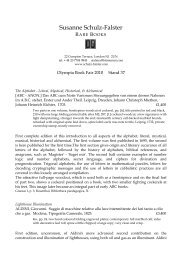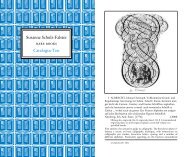Catalogue Number 7 - Susanne Schulz-Falster
Catalogue Number 7 - Susanne Schulz-Falster
Catalogue Number 7 - Susanne Schulz-Falster
Create successful ePaper yourself
Turn your PDF publications into a flip-book with our unique Google optimized e-Paper software.
change value, its importance for commerce and trade, and the inXuence of<br />
scarcity and supply and demand in the establishment of a price. However,<br />
he warns that monetary value and monetary riches are not the only aim in<br />
life. In individual chapters he discusses the inXuence of talent, courage,<br />
knowledge, and also government and climate on the active pursuit of riches.<br />
A further chapter deals with indirect measures such as frugality, and individual<br />
virtues such as honesty, constancy, and perseverance. He concludes<br />
that the pursuit of riches activates mostly positive ambition in individuals.<br />
However, the use and defence of riches brings less attractive features to the<br />
fore, such as luxury, avarice and ostentation.<br />
Magnanima’s work is bound with a collection of essays by Carmeli.<br />
(Dissertazioni. Padova, Stamperia del Seminario, 1756. pp. [viii], 56).<br />
Goldsmiths’–Kress 11232.9; not in Einaudi; NUC, RLIN and OCLC list just the<br />
Harvard copy.<br />
In Defence of Brothels<br />
46 [MANDEVILLE, Bernard.] Venus La populaire ou Apologie<br />
des Maison de Joye. .. Traduite de l’Anglois. A Londres [?The<br />
Netherlands.], chez A Moore, 1727. £ 750<br />
8vo, pp. xii, 130; uncut in the original marbled boards, spine lettered in<br />
manuscript, spine a little chipped and some wear to head and tail; title<br />
lightly browned, else very clean and crisp.<br />
Rare Wrst edition in French of Mandeville’s ironic defence of brothels, in the<br />
manner of his earlier Fable of the Bees and anticipating Swift’s Modest Proposal.<br />
The original was published in 1724 under the title A Modest Defence of<br />
Publick Stews: or, an Essay upon Whoring, with the preface signed ‘Phil-<br />
Pornix’. This work is a further expression of his pragmatic approach to morality,<br />
Wrst displayed in the Fable of the Bees, and here applied to prostitution.<br />
Again he uses paradox and wilful exaggeration to make his point, and eventually<br />
recommends governmental regulation of brothels and prostitution.<br />
In this work Mandeville states his utilitarianism most succinctly and<br />
shows himself a clear fore-runner of the nineteenth century utilitarian<br />
movement: ‘it is the grossest absurdity, and a perfect contradiction in terms,<br />
to assert, that a government may not commit Evil that good may come of it;<br />
for, if a publick Act, taking in all its Consequences, really produces a greater<br />
quantity of good, it must, and ought to be term’d a good act’ (Kaye, p. lx).<br />
ESTC t115816; Kaye I xxxi.<br />
47 [MARCELLO, Benedetto.] Il Teatro alla Moda, o sia Metodo<br />
sicuro, e facile per ben comporre, & esequire l’Opere Italiane in<br />
Musica all’uso moderno, nel quale si danno Avvertimenti utili, e<br />
necessarij a Poeti, Compositori di Musica, Musici dell’uno, e<br />
dell’altro sesso, Impresari, Suonatori, Ingegneri, e Pittori di Scene,<br />
susanne schulz-falster rare books catalogue seven<br />
Parti buVe, Sarti, Paggi, Comparse, Suggeritori, Copisti, Protettori,<br />
e Madri di Virtuose, & altre Persone appartenenti al Teatro. . .<br />
Stampato ne Borghi di Belisania per Aldiviva Ligante. . . [1720].<br />
£1200<br />
8vo, pp. 64; Wnely engraved emblematic title page vignette, decorated<br />
initials; title a little dust-soiled; contemporary full vellum, re-cased with<br />
new endpapers provided; a Wne copy.<br />
First edition, very rare, of this witty commentary on the Italian opera scene<br />
during the late Baroque period. To draw attention to declining standards<br />
in opera production, especially in the opera buVa, Marcello gives a satirical<br />
account of the various professions involved in the production of an opera<br />
and maintains that in fact none of them need to be trained professionals at<br />
all. One by one he assesses composers, librettists, singers and soloists,<br />
musicians, stage designers, dress-makers, and Wnally the all-important<br />
Wgure of the young diva’s mother. No need for the composer to know the<br />
classic principles of musical composition, so long as he produces catchy<br />
tunes. In the same vein, all other professionals are described as cutting corners<br />
and producing what is no longer a work of art, but instead merely a<br />
popular show. Marcello attacks stupidity and laziness in opera, and maintains<br />
that the audience treat it as a social occasion to be seen at, without<br />
having any real interest in music. Marcello (1686–1739), a Venetian aristocrat,<br />
fuses his satire with elements of true parody and caricature. His<br />
acute observations and timeless criticism of popular opera tradition ring<br />
true still today.<br />
In an ironic twist Marcello’s satire in itself became part of the musical<br />
tradition. Both Metastasio’s Didone abbandonata and Goldoni’s La Cantatrice<br />
take their main character from Marcello’s description of the constantly<br />
interfering diva’s mother.<br />
The false imprint is in fact composed of the names of famous singers of<br />
the time. The satire was very popular, and was reprinted not quite every<br />
year, as indicated on the title page, but in 1733 and 1735.<br />
Uncommon, NUC, RLIN and OCLC locate copies at Yale, Harvard, the University<br />
of Chicago and the Getty Library.



